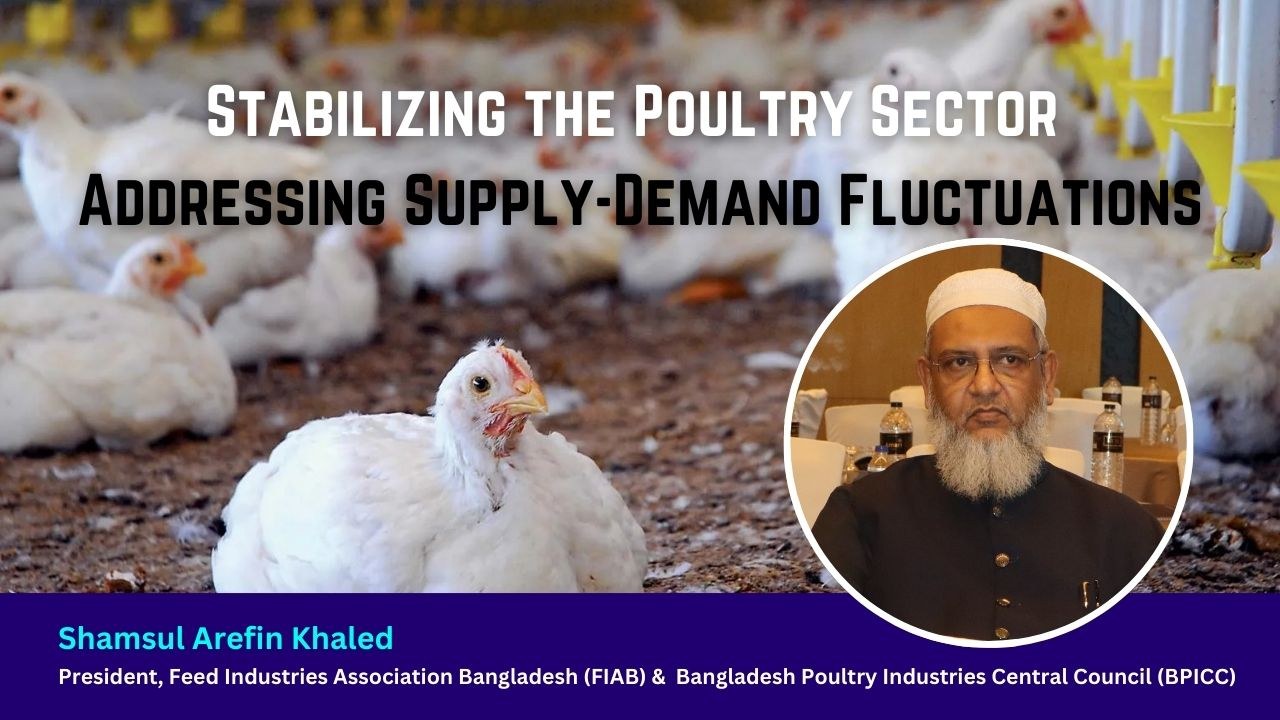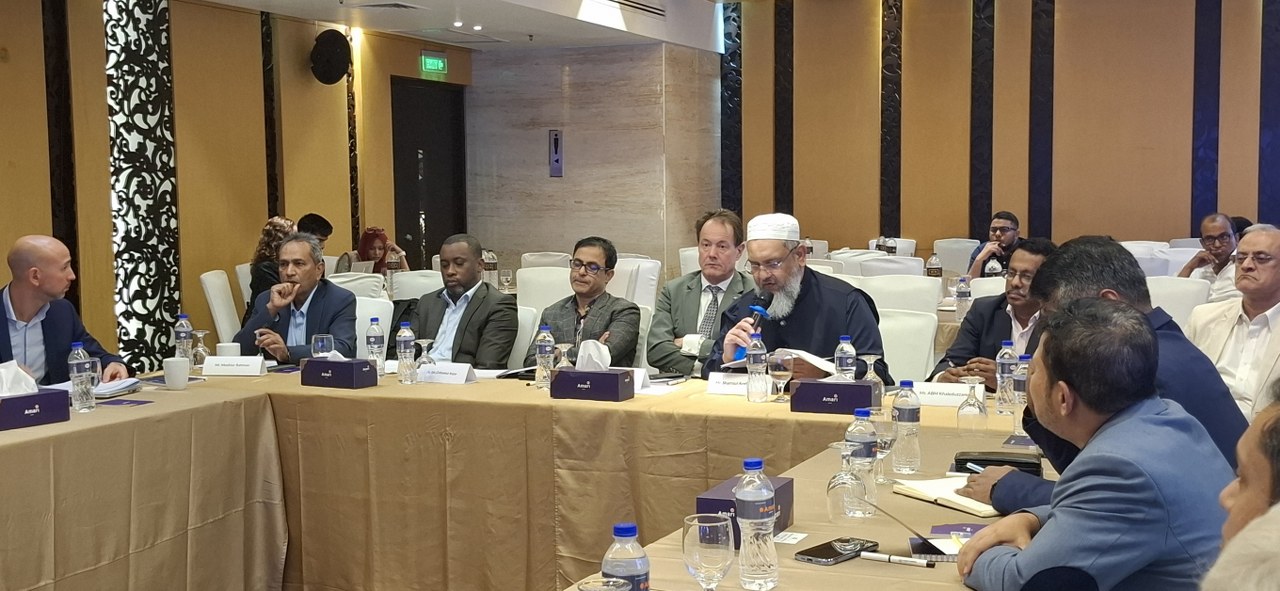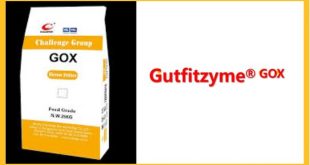 Shamsul Arefin Khaled: It is both a privilege and a responsibility to address this gathering on the crucial issue of stabilizing the poultry sector—a cornerstone of our nation’s food security, livelihoods, and economic strength. With its immense potential, this sector is a beacon of hope and a promise of a brighter future. Its importance cannot be overstated. However, it faces critical challenges that can only be overcome through immediate and unified action.
Shamsul Arefin Khaled: It is both a privilege and a responsibility to address this gathering on the crucial issue of stabilizing the poultry sector—a cornerstone of our nation’s food security, livelihoods, and economic strength. With its immense potential, this sector is a beacon of hope and a promise of a brighter future. Its importance cannot be overstated. However, it faces critical challenges that can only be overcome through immediate and unified action.
Understanding the Current Scenario
The poultry sector is currently grappling with a pressing instability issue, marked by three significant challenges: supply-side imbalance, price volatility, and demand-side unpredictability. The most urgent concern is price instability, a direct consequence of the supply-demand mismatch significantly impacting the industry. The frequent fluctuations in chicken and egg prices pose substantial challenges for producers and consumers and have profound social implications. This is a situation that demands our immediate attention and action.
A significant driver of this instability is the uncontrolled supply of Day-Old Chicks (DOC). Oversupply leads to drastic price drops, making production unprofitable. This, in turn, causes producers to withdraw, resulting in future supply shortages and price spikes, which disrupt long-term planning. Similarly, the oversupply of other poultry types, such as colored birds and layers, saturates the market, further reducing profitability across the industry.
 Additional factors compound these issues. Diseases, climate change, and limited access to credit aggravate farmer dropout rates, while demand-side disruptions, such as shifts in the availability of alternative proteins and declining incomes, further destabilize the sector. Seasonal spikes in demand, combined with unexpected events like extreme weather, amplify these imbalances, making stability even more elusive.
Additional factors compound these issues. Diseases, climate change, and limited access to credit aggravate farmer dropout rates, while demand-side disruptions, such as shifts in the availability of alternative proteins and declining incomes, further destabilize the sector. Seasonal spikes in demand, combined with unexpected events like extreme weather, amplify these imbalances, making stability even more elusive.
The Broader Impact
We appreciate the Directorate of National Consumer Rights Protection’s (DNCRP) commendable efforts to address these issues, such as mandating trading vouchers. Their work is crucial in our collective efforts to stabilize the poultry sector.
External economic pressures also contribute significantly. Dependence on imported raw materials exposes the sector to global price volatility, aggravated by a sharp rise in dollar rates. Domestically, rising inflation, energy costs, and increasing interest rates drive up operational expenses, adding financial pressure and fueling price volatility through cost-push inflation throughout the value chain.
Suggested Strategies to Address Supply-Demand Fluctuations
Stabilizing the poultry sector requires targeted, coordinated actions:
- Implement and Continuously Update Ministry Strategy Papers:
Regular updates are essential to align DOC production with demand and maintain market stability. Monthly reviews of these papers can help address dynamic market conditions while ensuring fair pricing for Parent Stock (PS) and DOC producers will sustain the entire value chain.
- Conduct Monthly Cost Evaluations:
Collaboration between the Department of Livestock Services (DLS) and stakeholders is necessary to evaluate production costs across the value chain. These evaluations will ensure rational pricing and fair profit margins, and the findings will be shared with relevant authorities for implementation.
- Adopt Data-Driven Price Fixation:
Accurate and representative data must inform pricing policies. Regular reviews, inclusive cost estimations, and guaranteed profit margins for producers are essential to promote sustainable growth and food security.
- Combat Market Manipulation:
Timely intervention is needed to prevent intermediaries from exploiting supply shortages or demand spikes. Strengthening oversight and addressing harmful propaganda against PS, DOC, and Feed producers are crucial for fostering trust and cooperation.
- Promote Farm Registration and Knowledge Dissemination:
Enforcing compulsory farm registration and promoting sound farming practices among smallholders will ensure long-term stability. Monitoring feed quality and eliminating harmful inputs are necessary to build a reliable supply chain.
Challenges to Overcome
While these strategies are promising, several challenges must be addressed:
- Resistance from Stakeholders: Conflicting interests or skepticism can hinder reforms. Building consensus and ensuring stakeholder compliance is vital. Large corporate producers across the value chain, in particular, must adhere to the Government’s decisions, policies, and strategic directives.
- Misinformation: False accusations, such as allegations of producer syndication, foster distrust. Promoting transparency and conducting public awareness campaigns are crucial to addressing and dispelling these misconceptions.
- Inadequate Data: Interventions must be based on robust and accurate data to be effective. Strengthening data collection systems from scientific and inclusive sample sizes should be the priority.
- Market Exploitation: Without proper oversight, intermediaries will continue exploiting market volatility, harming producers and consumers.
Call to Action
The time for decisive action is now. We must:
- Ensure stakeholders adhere to updated policies and strategies, emphasizing compliance with the Ministry’s Strategy Papers.
- Empower the Department of Livestock Services (DLS) to take the lead in aligning supply and demand, ensuring effective collaboration with the Directorate of Agriculture Marketing for price fixation and timely interventions.
- Provide targeted support programs for producers and consumers to navigate challenges.
- Implement comprehensive policy reforms to enhance transparency and regulate supply chains.
- Collaborate across government, private entities, and media to dispel misinformation and build trust.
Conclusion
Addressing these challenges through collective effort and evidence-based strategies can build a resilient, fair, and sustainable poultry industry. This will benefit producers and consumers and strengthen our nation’s food security and economic foundation. Let us work together to secure the future of this vital sector.
 Agrinews24 কৃষির সাথে, কৃষকের পাশে
Agrinews24 কৃষির সাথে, কৃষকের পাশে





















